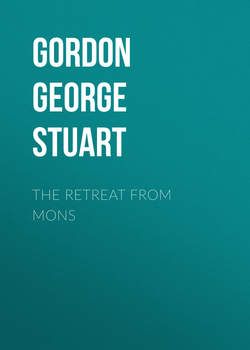The Retreat from Mons

Реклама. ООО «ЛитРес», ИНН: 7719571260.
Оглавление
Gordon George Stuart. The Retreat from Mons
PREFACE
The Operations of the BritishArmy in the Present War
INTRODUCTORY
THE RETREAT FROM MONS
Отрывок из книги
The first quality of British military operations in the present war-and so it will strike the future historian-is their astonishing variety and range. Beginning on the ancient battlefields of France and Flanders, they have spread, in a series of expanding and apparently inevitable waves, over a good part of three continents, so that, wherever the enemy was to be found, – whether in Europe, or Asia, or Africa, or in the islands of the high seas, – there also, sooner or later, were the British arms. There was a time when one or two campaigns were thought amply sufficient for the military energies of the most warlike nation. We have never pretended to be warlike, meeting our emergencies always, with a certain reluctance, as they arose; but in the present war we have seldom had fewer than six considerable campaigns on our hands at one time, and these in areas separated often by thousands of miles from one another and from us. It is one of the obligations of a great empire at war that it should be so; it is one of the privileges of a great maritime empire that it should be possible. It is undoubtedly the grand characteristic of the operations of the British Army in this war, and gives the only true perspective of our military effort in the field. To our share in the Allied front must always be added the fighting frontiers of the Empire.
The British Army, now grown out of all recognition, was small, and known to be small, when the war began. It was a voluntary army, numbering approximately 700,000 men, of whom about 450,000 (including reservists) were trained soldiers, liable for service abroad, and the remainder, a half-trained Territorial Force, enrolled for service at home. Besides being small, it was, from the nature of its duties, widely scattered. Over 100,000 of our best troops were serving at the time in India or on foreign stations. For all purposes, therefore, when war broke out, we had in this country a mobilizable army of something under 600,000 trained and half-trained men, 250,000 of whom were liable only for service at home. The striking or Expeditionary Force of this army was a fully equipped and highly professional body of six infantry divisions and one division of cavalry, and with this force we entered the war. Intended primarily, as its name implied, for protective or punitive operations within the Empire, it was on a scale proportionate to its purpose and to the size of our army. Our army, judged by a European standard, being small, our Expeditionary Force, judged by that standard, was diminutive; and the chief problem which confronted the Government, when it was decided to send this force to France, was how to support and supplement it. The story of how this problem was faced and overcome, of how "Home Service" men became "Foreign Service" in a day, and our little army of 700,000, by a gigantic effort of British determination and Imperial good-will, was expanded into an army of millions-all this is a separate narrative, to be related elsewhere; but we cannot afford to overlook it as we follow the fortunes of the Expeditionary Force in France and Flanders. It is the military background of all their triumphs and vicissitudes, and had an effect upon the tone of the war almost from the first. Even to our Expeditionary Force itself, with all its cheerful self-confidence and efficiency, it meant something to know that the country was in earnest; that as early as August 23, while they were still fighting among the coal-pits of Mons, the first 100,000 volunteers had been enrolled, and were already deep in the mysteries of forming fours.
.....
Such opinions were worth much. For though it is a great thing to be welcomed, as our men were welcomed, by a whole people, to have the hearty professional approval of its soldiers is a greater thing still.
The Expeditionary Force, thus landed in France, was organized in two army corps-the First, consisting of the First and Second Divisions, under Lieutenant-General Sir Douglas Haig; the second, consisting of the Third and Fifth Divisions, under Lieutenant-General Sir James Grierson, who was succeeded, on his sudden and much lamented death, by General Sir Horace Smith-Dorrien. General Allenby commanded the cavalry division, consisting of the First, Second, Third, and Fourth Cavalry Brigades, and the Fifth Cavalry Brigade was commanded independently by Brigadier-General Sir Philip Chetwode. By the evening of Friday, August 21, the concentration was practically complete, and during Saturday the 22d the Force moved up to its position on the left or western extremity of the French line. (Plan 1.)
.....